
Thespis, or The Gods Grown Old, is an operatic extravaganza that was the first collaboration between dramatist W. S. Gilbert and composer Arthur Sullivan. No musical score of Thespis was ever published, and most of the music has been lost. Gilbert and Sullivan went on to become the most famous and successful artistic partnership in Victorian England, creating a string of enduring comic opera hits, including H.M.S. Pinafore, The Pirates of Penzance and The Mikado.

Cox and Box; or, The Long-Lost Brothers, is a one-act comic opera with a libretto by F. C. Burnand and music by Arthur Sullivan, based on the 1847 farce Box and Cox by John Maddison Morton. It was Sullivan's first successful comic opera. The story concerns a landlord who lets a room to two lodgers, one who works at night and one who works during the day. When one of them has the day off, they meet each other in the room and tempers flare. Sullivan wrote this piece five years before his first opera with W. S. Gilbert, Thespis.
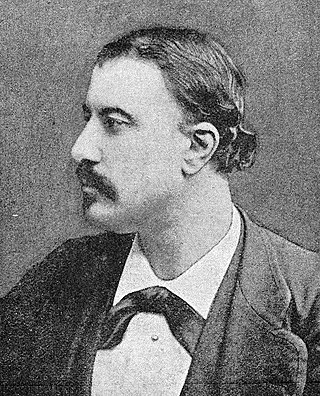
Frederic Emes Clay was an English composer known principally for songs and his music written for the stage. Although from a musical family, for 16 years Clay made his living as a civil servant in HM Treasury, composing in his spare time, until a legacy in 1873 enabled him to become a full-time composer. He had his first big stage success with Ages Ago (1869), a short comic opera with a libretto by W. S. Gilbert, for the small Gallery of Illustration; it ran well and was repeatedly revived. Clay, a great friend of his fellow composer Arthur Sullivan, introduced the latter to Gilbert, leading to the Gilbert and Sullivan partnership.

The German Reed Entertainments were founded in 1855 and operated by Thomas German Reed (1817–1888) together with his wife, Priscilla German Reed (1818–1895). At a time when the theatre in London was seen as a disreputable place, the German Reed family provided family-friendly entertainments for forty years, showing that respectable theatre could be popular.
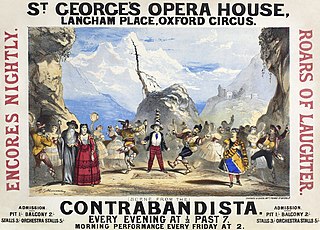
The Contrabandista, or The Law of the Ladrones, is a two-act comic opera by Arthur Sullivan and F. C. Burnand. It premiered at St. George's Hall, in London, on 18 December 1867 under the management of Thomas German Reed, for a run of 72 performances. There were brief revivals in Manchester in 1874 and America in 1880. In 1894, it was revised into a new opera, The Chieftain, with a completely different second act.

A Sensation Novel is a comic musical play in three acts written by the dramatist W. S. Gilbert, with music composed by Thomas German Reed. It was first performed on 31 January 1871 at the Royal Gallery of Illustration. Only four of German Reed's songs survive. Nearly 25 years later, the music was rewritten and published by Florian Pascal. The story concerns an author suffering from writer's block who finds that the characters in his novel are dissatisfied.

Thomas German Reed, known after 1844 as simply German Reed was an English composer, musical director, actor, singer and theatrical manager of the Victorian era. He was best known for creating the German Reed Entertainments, together with his actress wife, a genre of musical plays that made theatre-going respectable at a time when the stage was considered disreputable.

Ages Ago, sometimes stylised as Ages Ago! or Ages Ago!!, is a musical entertainment with a libretto by W. S. Gilbert and music by Frederic Clay that premiered on 22 November 1869 at the Royal Gallery of Illustration. It marked the beginning of a seven-year collaboration between Gilbert and Clay. The piece was a critical and popular success and was revived many times, including at St. George's Hall, London in 1870 and 1874, and in New York in 1880.

Our Island Home is a one-act musical entertainment with a libretto by W. S. Gilbert and music by Thomas German Reed that premiered on 20 June 1870 at the Royal Gallery of Illustration. The piece has five characters and is "biographical", in that the characters in the original production played themselves, except that they were given personalities opposite to their actual personalities.
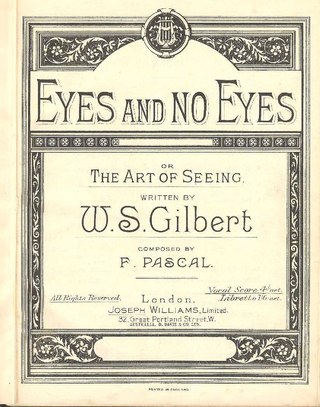
Eyes and No Eyes, or The Art of Seeing is a one-act musical entertainment with a libretto by W. S. Gilbert and music originally by Thomas German Reed. The story concerns two sisters who love flirtatious twin brothers. The sisters lose their uncle's wedding cloak. To avoid his anger, they persuade him that the cloak is magically visible only to true lovers and invisible to flirts.
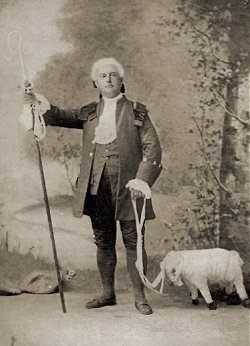
Happy Arcadia is a musical entertainment with a libretto by W. S. Gilbert and music originally by Frederic Clay that premiered on 28 October 1872 at the Royal Gallery of Illustration. It was one of four collaborations between Gilbert and Clay between 1869 and 1876. The music is lost. The piece is a satire on the genre of pastoral plays in which the characters, who each wish that they could be someone else, have their wish granted, with unhappy results.

Sir William Schwenck Gilbert was an English dramatist, librettist, poet and illustrator best known for his collaboration with composer Arthur Sullivan, which produced fourteen comic operas. The most famous of these include H.M.S. Pinafore, The Pirates of Penzance and one of the most frequently performed works in the history of musical theatre, The Mikado. The popularity of these works was supported for over a century by year-round performances of them, in Britain and abroad, by the repertory company that Gilbert, Sullivan and their producer Richard D'Oyly Carte founded, the D'Oyly Carte Opera Company. These Savoy operas are still frequently performed in the English-speaking world and beyond.
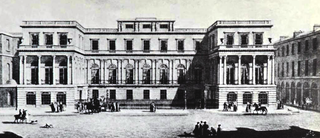
The Royal Gallery of Illustration was a 19th-century performance venue located at 14 Regent Street in London. It was in use between 1850 and 1873.
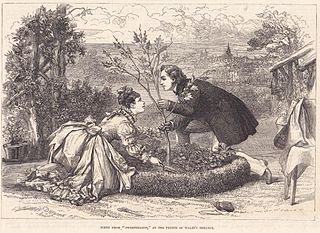
Sweethearts is a comic play billed as a "dramatic contrast" in two acts by W. S. Gilbert. The play tells a sentimental and ironic story of the differing recollections of a man and a woman about their last meeting together before being separated and reunited after 30 years.

The Princess is a blank verse farcical play, in five scenes with music, by W. S. Gilbert which adapts and parodies Alfred Lord Tennyson's humorous 1847 narrative poem, The Princess. It was first produced at the Olympic Theatre in London on 8 January 1870.

Robert the Devil, or The Nun, the Dun, and the Son of a Gun is an operatic parody by W. S. Gilbert of Giacomo Meyerbeer's grand opera Robert le diable, which was named after, but bears little resemblance to, the medieval French legend of the same name. Gilbert set new lyrics to tunes by Meyerbeer, Bellini, Offenbach and others.

Arthur Cecil Blunt, better known as Arthur Cecil, was an English actor, comedian, playwright and theatre manager. He is probably best remembered for playing the role of Box in the long-running production of Cox and Box, by Arthur Sullivan and F. C. Burnand, at the Royal Gallery of Illustration.

La Vivandière; or, True to the Corps! is a burlesque by W. S. Gilbert, described by the author as "An Operatic Extravaganza Founded on Donizetti's opera, La figlia del regimento." In the French or other continental armies a vivandière was a woman who supplied food and drink to troops in the field.
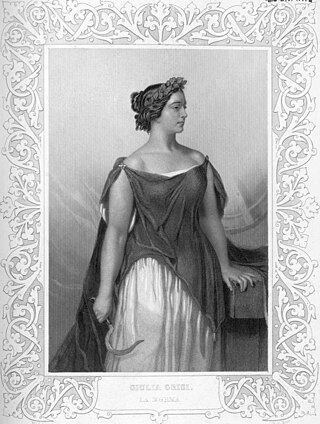
The Pretty Druidess; Or, The Mother, The Maid, and The Mistletoe Bough is an operatic burlesque by W. S. Gilbert. It was produced at the opening of the new Charing Cross Theatre on 19 June 1869 and ran until September of that year.

Rosa D'Erina, born Rose Anna O'Toole and known as the "Irish prima donna", was an Irish soprano, pianist and organist. She was the "vocalist by command to the Prince and Princess of Wales and the Irish court."



















